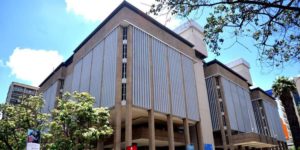
May 14, 2020//-Faced with the Covid-19 pandemic crisis, President Uhuru Kenyatta commendably announced a stimulus package aimed at putting money into people’s pockets in order to stimulate the economy.
He asked the National Treasury to offer a 100 percent tax relief for persons with a gross monthly income of up to Sh24, 000.
Other economic measures included: an appropriation of Sh10 billion to orphans, the elderly and other vulnerable members of society through the cash transfers programme at the Ministry of Labour and Social Protection.
The President also temporarily suspended any adverse listings in the Credit Reference Bureaus for Micro, Small and Medium Enterprises (MSMEs) and large companies in the event their loans fall overdue or in arrears effective April 1, 2020.
He also directed government ministries and departments to pay at least Sh13 billion of what they owed suppliers within three weeks.
A similar directive was given to private enterprises to also pay outstanding debts to MSMEs. The Kenya Revenue Authority (KRA) was also directed to expedite VAT refunds amounting to Sh10 billion to all verified claims.
Further, the President directed that Sh1 billion be appropriated from the Universal Health Coverage to recruit additional staff to beef up the current compliment that is fighting coronavirus.
Parliament, as expected, did its part by approving the proposals with the urgency that that was required to fight the raging pandemic.
On economic interventions, the President asked the Central Bank of Kenya to lower the Central Bank Rate (CBR) by one percentage point, to 7.25 percent. Over the past two years, the rate has dropped from a high of 10 percent.
It also freed up more cash for lending by lowering the Cash Reserve Ratio (CRR) by one percentage point to 4.25 percent. CBK also directed banks to be flexible on loans that were performing as of 2nd March but need to be rescheduled because of the Covid-19 inconveniences.
On their part, the banks just announced that whoever needed to reschedule their debt should visit the institutions. They kept put with the 1 percentage point that they were to pass on to the consumers. Their lending rates have inexplicably remained the same since when the CBR was at 10 percent.
The sole purpose why the President made all these sweeping changes was to stimulate the economy. It was never to widen the bank margins.
The greed with which financial institutions have pocketed 2.75 percent in enhanced margins and subsequent silence at the time of crisis makes even the most ardent capitalist to embrace a controlled spread between savings and lending rates.
The fat profits these banks will announce will end up in the pockets of the super-rich, and continue widening the income disparities that are shamelessly repugnant.
Oxfam International says that less than 0.1 percent of the population (8,300 people) owns more wealth than the bottom 99.9 percent. The richest 10 percent of people in Kenya earned on average 23 times more than the poorest 10 percent.
The monetary interventions made by CBK at the request of the President were in no way meant to boost the profits of the banks.
The money was meant to go to the pockets of bank customers to keep them going and service their loans. Effectively, the conduct of the banks is akin to killing the “Goose that lays the eggs.”
It is even worse that banks have not disclosed the terms of rescheduling debt for consumers to make an informed decision.
In the absence of information, we can only assume that it is more beneficial to the banks than to lower the rate. In which case their only focus is how to maximise returns out of the current adversity.
Yet when adversity strikes them as has happened in the past, they rush to government to bail them out using taxpayers’ money.
It is inexcusable to report profits in billions, which ordinarily should have gone to consumers to prop up the economy. A strong economy is also beneficial to the banks.
This is not a favour that banks need to do to their customers. It is money advanced to customers through monetary interventions to fight a possible recession that could impact them more severely in a few months to come.


